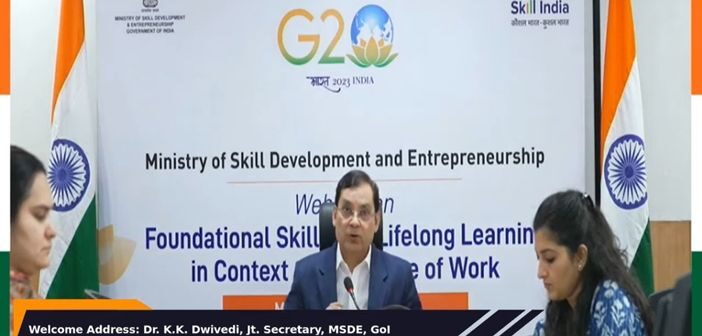The Ministry of Skill Development & Entrepreneurship (MSDE) organised the 2nd webinar on the topic of “Foundational skills and lifelong learning in the context of future of work” on March 21st, 2023, in advance of the upcoming third G20 Education Working Group meeting, which took place in Bhubaneswar.
The webinar was attended by an esteemed panel including Shri Atul Kumar Tiwari, Secretary, MSDE; Shri Sanjay Kumar, Secretary, Department of School Education and Literacy, Shri Nirmaljit Singh Kalsi, Chairperson, National Council for Vocational Education and Training (NCVET), Dr Krishna Kumar Dwivedi, Joint Secretary, MSDE; and Dr. Maneesh Mishra, Executive Vice President- Strategy, NSDC along with key stakeholders in the skill ecosystem and industry experts.

To effectively measure the learning outcomes in light of the rise of automation across industries, it is imperative to mainstream foundational skills into the curriculum framework. The webinar provided a special platform for discussing about how to improve youth capacity and encourage lifelong learning by focusing on disruptive technology so that they can adapt to the constantly changing nature of the future of work.
According to Shri Atul Kumar Tiwari, Secretary, MSDE, “The rapidly evolving world demands more than knowledge acquisition; students must develop the ability to learn how to learn to navigate the challenges of the future of work and embrace the real-world situation. To enable students to excel academically and ultimately improve their quality of life, the education system should promote the development of foundational skills as well as higher-order cognitive skills such as problem solving and critical thinking. As a result, education stakeholders must collaborate in order to encourage foundational learning so that students are prepared for the future. This can be achieved through the integration of technology and blended learning, as well as the development of robust monitoring and evaluation mechanisms to track learning outcomes. The future of work emphasizes the need for formal recognition of universal entitlement of learning and establishment of effective lifelong learning ecosystem.”
In order to discuss the significance of foundational skills among school-age learners as well as how they can adapt to “learn to learn learning” to develop solutions for ongoing global challenges, with climate change being a priority, the webinar brought together industry leaders, academics, and organisations. Leading experts from the Department of School Education & Literacy, Ministry of Education (MoE), NCVET and international organisations, Asian Development Bank, and OECD presented their perspectives on early skill identification and the role that the public and private sectors can play in providing foundational skills.
The first session, titled “Shaping the future workforce with skills to succeed,” featured discussions on how the G20 countries can work together to help people in realising their full potential. This is crucial since the World of Work is changing as a result of globalisation, new technology, migration, and labour market changes. All of the speakers agreed that the curriculum that some of the stakeholders are developing must urgently include relevant skills like scientific temperament, creativity, communication, and problem-solving. Education must also be made a continuous process, with opportunities for learning and upskilling accessible throughout an individual’s life.
Dr. Krishna Kumar Dwivedi, Joint Secretary, MSDE, stated, “The rapid proliferation of emerging technologies is fundamentally transforming the way we work, and as a result, predicting the future of work trends has become an increasingly complex and challenging task.” Considering the potential for these technologies to replace humans in certain roles, it is essential that we adapt quickly to shifting market demands. ChatGPT’s role in the workplace is expanding, and its capabilities suggest that it could soon replace up to 20 human job jobs. To develop a vibrant ecosystem and address the challenges of the future of work, coordinated efforts are required.”
Shri Sanjay Kumar, Secretary, Department of School Education & Literacy, Ministry of Education, said, “The Hon’ble Prime Minister Narendra Modi often remarked that the greatest challenges that the world face today can only be solved by acting together, and amongst the various skills that we talk about, collaboration happens to be one of the key ones. We live in a world with environmental and political challenges, migration, new technology, and globalisation.”
The discussion also shed light on how the government, academia, and industry are working to establish a system for delivering foundational skills and facilitating dynamic learning over the life cycle to ensure people keep up with current trends. They also acknowledged the positive roles that the National Skills Qualification Framework (NSQF) and the National Education Policy (NEP) 2020 have played in enhancing foundational skills.
The second session, Transitioning from Recognition of Prior Learning (RPL) to Recognition of Continuous Learning (RCL), focused on how this shift is critical for the G20 nations, particularly as they are experiencing a paradigm shift in the composition of employment, marked by the introduction of new jobs requiring high-level cognition and socio-emotional skills. The panelists emphasised the importance of deliberating on how the future of work is changing, capitalising on emerging opportunities, and assessing all learning. This will remove any ambiguity and create academic equivalence between vocational education and general education, enabling mobility and promoting prior and continuous learning.
Also read: MSDE organised G20 webinar on “Mega Trends shaping the future of work” to discuss the dynamics of the changing workplace https://nationalskillsnetwork.in/msde-organised-g20-webinar-on-mega-trends-shaping-the-future-of-work-to-discuss-the-dynamics-of-the-changing-workplace/
The four pillars of learning to be, learn to know, learn to do, and learn to exist together will need to support lifelong learning in the future. These are also essential as India aims to create a framework for skill-based learning that will complement students’ knowledge-based learning. This will help the nation in rethinking lifelong learning in the context of ongoing changes and creating a robust digital infrastructure that will contribute to the development of a future-ready workforce.
The webinar focused on identifying policies and practises across various themes to strengthen teaching and learning methods, contents, curricula, and assessment frameworks, making education more relevant in the aspect of capacities and skills required in G20 nations.













